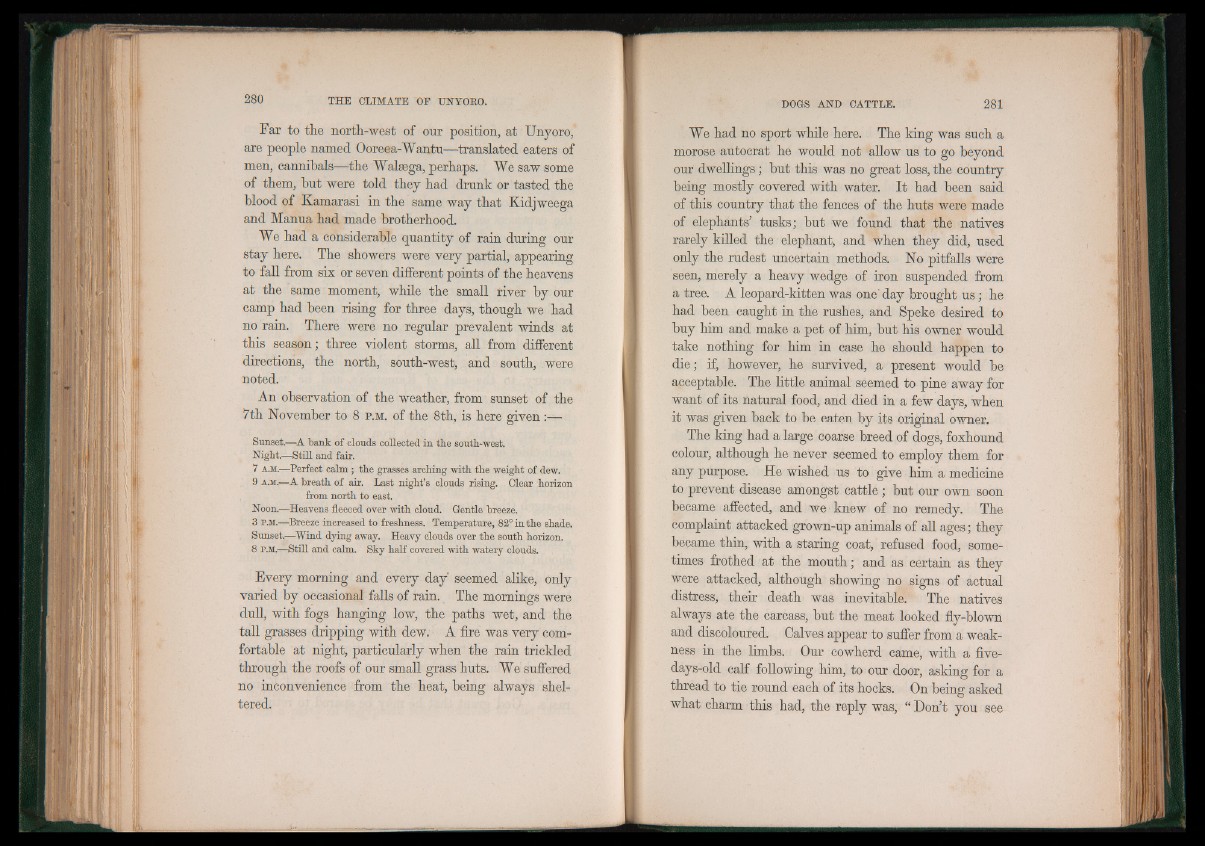
Fax to the north-west of our position, at Unyoro,
are people named Ooreea-Wantu—translated eaters of
men, cannibals—the Walsega, perhaps. We saw some
of them, but were told they had drunk or tasted the
blood of Kamarasi in the same way that Kidjweega
and Manua had made brotherhood.
We had a considerable quantity of rain during our
stay here. The showers were very partial, appearing
to fall from six or seven different points of the heavens
at the same moment, while the small river by our
camp had been rising for three days, though we had
no rain. There were no regular prevalent winds at
this season; three violent storms, all from different
directions, the north, south-west, and south, were
noted.
An observation of the weather, from sunset of the
7th November to 8 p .m. of the 8th, is here given :—
Sunset.—A b a n t of clouds collected in the soutb-west.
Night.—Still and fair.
7 a .m.—Perfect calm ; the grasses arching with the weight of dew.
9 a .m.—A breath of air. Last night’s clouds rising. Clear horizon
from north to east.
Noon.—Heavens fleeced over with cloud. Gentle breeze.
3 p .m.— Breeze increased to freshness. Temperature, 82° in the shade.
Sunset.—Wind dying away. Heavy clouds over the south horizon.
8 p .m.—Still and calm. Sky half covered with watery clouds.
Every morning and every day seemed alike, only
varied by occasional falls of rain. The mornings were
dull, with fogs hanging low, the paths wet, and the
tall grasses dripping with dew. A fire was very comfortable
at night, particularly when the rain trickled
through the roofs of our small grass huts. We suffered
no inconvenience from the heat, being always sheltered.
We had no sport while here. The king was such a
morose autocrat he would not allow us to go beyond
our dwellings; but this was no great loss, the country
being mostly covered with water. It had been said
of this country that the fences of the huts were made
of elephants’ tusks; but we found that the natives
rarely killed the elephant, and when they did, used
only the rudest uncertain methods. No pitfalls were
seen, merely a heavy wedge of iron suspended from
a tree. A leopard-kitten was one' day brought u s; he
had been caught in the rushes, and Speke desired to
buy him and make a pet of him, but his owner would
take nothing for him in case he should happen to
die; if, however, he survived, a present would be
acceptable. The little animal seemed to pine away for
want of its natural food, and died in a few days, when
it was given back to be eaten by its original owner.
The king had a large coarse breed of dogs, foxhound
colour, although he never seemed to employ them for
any purpose. He wished us to give him a medicine
to prevent disease amongst cattle; but our own soon
became affected, and we knew of no remedy. The
complaint attacked grown-up animals of all ages; they
became thin, with a staring coat, refused food, sometimes
frothed at the mouth; and as certain as they
were attacked, although showing no signs of actual
distress, their death was inevitable. The natives
always ate the carcass, but the meat looked fly-blown
and discoloured. Calves appear to suffer from a weakness
in the limbs. Our cowherd came, with a five-
days-old calf following him, to our door, asking for a
thread to tie round each of its hocks. On being asked
what charm this had, the reply was, “ Don’t you see